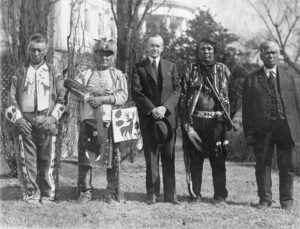 Not only does November mark the beginning of Native American Heritage Month, but this year in particular holds a great deal of significance to the advancement of civil rights for Native Americans. In 1924, US President Calvin Coolidge signed the Indian Citizenship Act, which extended US citizenship to Native Americans living on reservations. While a majority of Native Americans were already recognized as US Citizens at this time, this was only because those Native Americans had moved off of reservations, assimilated into US society, or had served in the military during World War One. Coolidge affirmed that all Native Americans, regardless of where they lived, had a birthright claim to US citizenship, and that all our civil liberties and rights rightfully belonged to Native Americans.
Not only does November mark the beginning of Native American Heritage Month, but this year in particular holds a great deal of significance to the advancement of civil rights for Native Americans. In 1924, US President Calvin Coolidge signed the Indian Citizenship Act, which extended US citizenship to Native Americans living on reservations. While a majority of Native Americans were already recognized as US Citizens at this time, this was only because those Native Americans had moved off of reservations, assimilated into US society, or had served in the military during World War One. Coolidge affirmed that all Native Americans, regardless of where they lived, had a birthright claim to US citizenship, and that all our civil liberties and rights rightfully belonged to Native Americans.
Our home state of New Jersey has an extensive history of Native American settlement, dating back over 10,000 years prior to European exploration on the continent. The Lenape tribe were the predominant inhabitants of present-day New Jersey, numbering around 20,000. In fact, Lenape translates to “original people”. However, the Lenape and similar large-scale tribes were comprised of subgroups that differed by cultural practices and linguistic dialects. The Nanticoke tribe also traces back to southern New Jersey, although they were primarily located in Delaware and Maryland.
The first Native American reservation created by European settlers was located in the British colony of New Jersey, named “Brotherton”. Located in Burlington County, it was the predecessor to the current community of Indian Mills in Shamong Township. The remaining Lenape tribes in the US currently recognized by the federal government – all of which have previously been forcibly relocated – include the Delaware Nation (Anadarko, OK), the Delaware Tribe of Indians (Bartlesville, OK), and the Stockbridge-Munsee Community (Bowler, WI). However, many unrecognized Lenape groups still exist in New Jersey and elsewhere in the US.
The legacy of the Lenape tribe continues to live on through the efforts of its descendants and multiple organizations. This month, the New Jersey Commission on American Indian Affairs will oversee its inaugural “Intertribal Youth Conference”. Additionally, the Department of Veteran Affairs and the Substance Abuse and Mental Health Services Administration (SAMSHA) will collaborate on a “Cultural Awareness Summit” between November 14th and 15th. Programs continue to celebrate and benefit communities and individuals of Lenape descent through organizations such as the Nanticoke Lenni-Lenape Tribal Nation and the Ramapo Munsee Lenape Nation. Information on all of these organizations and events can be found using the source links below.
Sources & Further Reading
- The Gilder Lehrman Institute of American History: The Brotherton Indians of New Jersey, 1780 – https://www.gilderlehrman.org/history-resources/spotlight-primary-source/brotherton-indians-new-jersey-1780
- com: Congress Enacts the Indian Citizenship Act – https://www.history.com/this-day-in-history/the-indian-citizenship-act
- Nanticoke Lenni-Lenape Nation: Official Website Homepage – https://www.nlltribalnation.org/
- com: History, Native Americans – https://www.newjerseyalmanac.com/native-americans.html#:~:text=The%20area%20now%20making%20up%20the%20state%20of,to%20be%20part%20of%20the%20larger%20Algonquin%20tribe.
- New Jersey Department of State: Commission on American Indian Affairs – https://nj.gov/state/njcaia.shtml
- Ramapo Munsee Lenape Nation: Official Website Homepage – https://ramapomunsee.net/
- US Department of the Interior: Indian Affairs, National Native American Heritage Month – https://www.bia.gov/NNAHM
